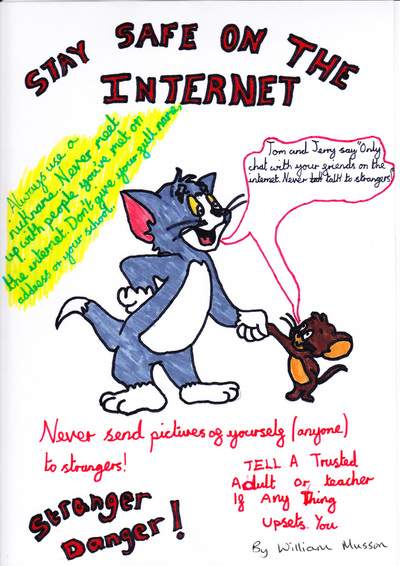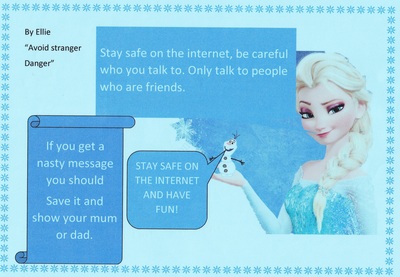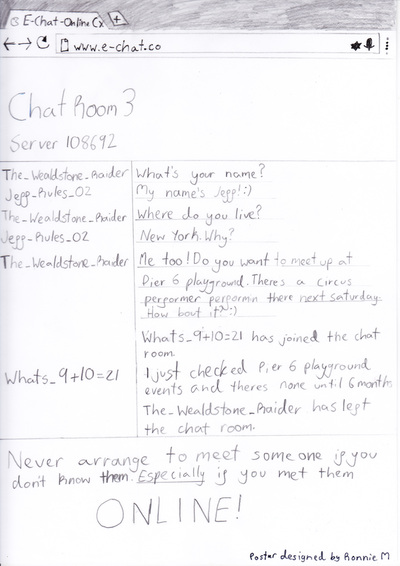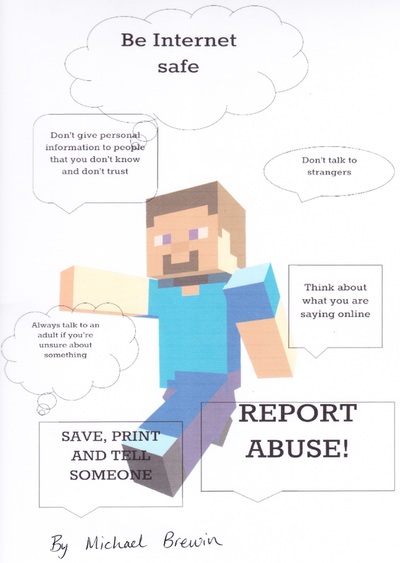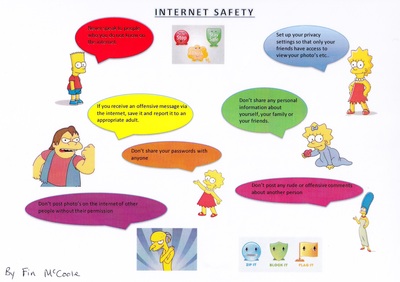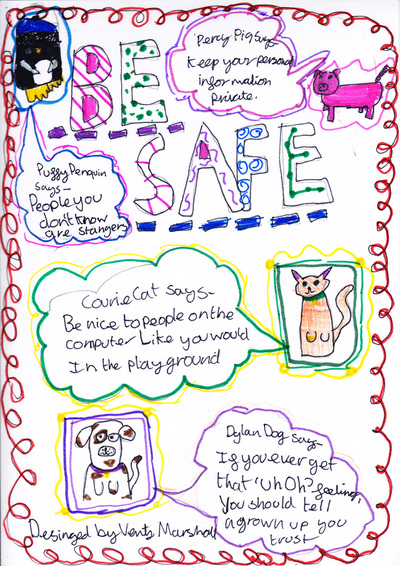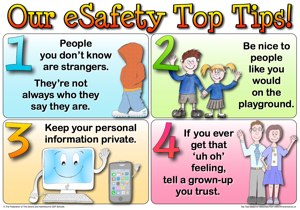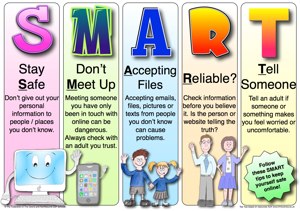eSafety & Internet Safety
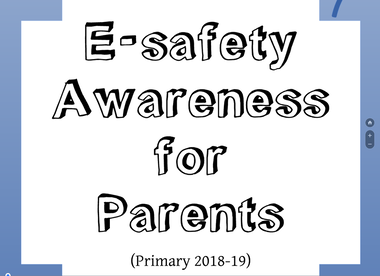
Children at Hathern CE Primary use the Internet on a regular basis as part of their learning. E-Safety is an important part of keeping children safe at School. We have extensive security measures in place in school, which are monitored both internally and externally, to help safeguard pupils from potential dangers or unsuitable material. Any e-safety incidents are recorded and managed in accordance with our E-Safety Policy. E-Safety is taught to all pupils explaining and demonstrating how to stay safe and behave appropriately online. We can only be successful in keeping children safe online if we work with you to ensure the e-safety message is consistent. Your help is needed to talk to your children about how they can keep safe and behave appropriately online.
Three quick simple tips for keeping your children safe online, include:
+ Take it back to basics – if a stranger contacts you online, do not respond.
+ Remember, there are age limits on apps and websites for a reason, always make sure the apps on your child’s device is appropriate
+ Make sure your child knows if they are concerned about something they have seen or been in contact with online, they should talk to a trusted adult.
Click on the image to the above/right to read the most recent e-Safety advice from the Local Authority.
Three quick simple tips for keeping your children safe online, include:
+ Take it back to basics – if a stranger contacts you online, do not respond.
+ Remember, there are age limits on apps and websites for a reason, always make sure the apps on your child’s device is appropriate
+ Make sure your child knows if they are concerned about something they have seen or been in contact with online, they should talk to a trusted adult.
Click on the image to the above/right to read the most recent e-Safety advice from the Local Authority.
Follow the Golden Rules
Ground Rules
* Discuss as a family how the internet will be used in your house. Consider what should be kept private online and decide rules for making and meeting online friends. Make sure you know what your child is doing online much like you would offline. 1 in 4 children arrange to meet someone face to face that they have spoken to online.
Online Safety
* Install antivirus software, secure your internet connection and use parental control functions for computers, mobile phones and games consoles to block unsuitable content or contact. Remember that parental control tools are not always 100% effective and sometimes unsuitable content can get past them, so don’t rely on them alone to protect your child.
* Use a filter to avoid access to innapproriate or offensive content. At school we use Surf Protect to keep all the bad stuff out.
Location
* Locate your computer or monitor the use of a tablet/iPad in a supervised family area. Always supervise the use of webcams and applications which allow voice or video chat. Consider your child’s use of other devices that allow internet access such as mobile phones and games consoles.
Dialogue
* Talk to your child and ask them to show or even teach you how they use the internet, learn which websites or tools they like to use and why. Learning together can often open opportunities to discuss safe behaviour with your child.
* Always ensure your child knows how to block or report people online who send nasty or inappropriate messages or content. Encourage your child not to retaliate or reply. Screen shots should be kept as evidence, if needed by appropriate agencies to pursue and take necessary steps of action.
* Make sure your child knows to tell an adult they trust if they see something online that makes them feel scared, worried or uncomfortable.
It’s essential to be realistic - banning the internet or technology will not work and it often makes a child less likely to report a problem. Education around safe use is essential.
Here are some tips and useful links to help you to keep your children safe online:
Explore e-safety sites - There are lots of links to useful e-safety sites for children on the internet. They are great fun to explore, so why not browse through them with your children?
Instagram / WhatsApp / SnapChat - Some sites have minimum age limits, so our pupils should NOT be using them.
Download our eSafety Posters - We have e-safety posters on display in our classrooms. Why not talk about the messages in the posters with your children?
Ground Rules
* Discuss as a family how the internet will be used in your house. Consider what should be kept private online and decide rules for making and meeting online friends. Make sure you know what your child is doing online much like you would offline. 1 in 4 children arrange to meet someone face to face that they have spoken to online.
Online Safety
* Install antivirus software, secure your internet connection and use parental control functions for computers, mobile phones and games consoles to block unsuitable content or contact. Remember that parental control tools are not always 100% effective and sometimes unsuitable content can get past them, so don’t rely on them alone to protect your child.
* Use a filter to avoid access to innapproriate or offensive content. At school we use Surf Protect to keep all the bad stuff out.
Location
* Locate your computer or monitor the use of a tablet/iPad in a supervised family area. Always supervise the use of webcams and applications which allow voice or video chat. Consider your child’s use of other devices that allow internet access such as mobile phones and games consoles.
Dialogue
* Talk to your child and ask them to show or even teach you how they use the internet, learn which websites or tools they like to use and why. Learning together can often open opportunities to discuss safe behaviour with your child.
* Always ensure your child knows how to block or report people online who send nasty or inappropriate messages or content. Encourage your child not to retaliate or reply. Screen shots should be kept as evidence, if needed by appropriate agencies to pursue and take necessary steps of action.
* Make sure your child knows to tell an adult they trust if they see something online that makes them feel scared, worried or uncomfortable.
It’s essential to be realistic - banning the internet or technology will not work and it often makes a child less likely to report a problem. Education around safe use is essential.
Here are some tips and useful links to help you to keep your children safe online:
Explore e-safety sites - There are lots of links to useful e-safety sites for children on the internet. They are great fun to explore, so why not browse through them with your children?
Instagram / WhatsApp / SnapChat - Some sites have minimum age limits, so our pupils should NOT be using them.
Download our eSafety Posters - We have e-safety posters on display in our classrooms. Why not talk about the messages in the posters with your children?
Some links to more information:
Think U Know - containing internet safety advice for those aged from 5 to 16, along with parents and teachers, this site is produced by CEOP (the Child Exploitation and Online Protection Centre).
Vodafone Parents - Vodafone have lots of fantastic practical advice for parents. You can also read their 'Digital Parenting' magazine.
Internet Matters - Simple, easy and practical advice about online safety.
Parentzone - Provider of sound advice for parents in a digital age.
Kidsmart - An award-winning internet safety programme for children.
Bullying UK - Information and advice about cyberbullying for children, parents and schools.
CEOP (The Child Exploitation and Online Protection Centre) - Dedicated to tackling the abuse and exploitation of children in the real and ‘e’ world. Often it is referred to as an online 999.
Childline - Free helpline (and website) for children and young people in the UK.
Think U Know - containing internet safety advice for those aged from 5 to 16, along with parents and teachers, this site is produced by CEOP (the Child Exploitation and Online Protection Centre).
Vodafone Parents - Vodafone have lots of fantastic practical advice for parents. You can also read their 'Digital Parenting' magazine.
Internet Matters - Simple, easy and practical advice about online safety.
Parentzone - Provider of sound advice for parents in a digital age.
Kidsmart - An award-winning internet safety programme for children.
Bullying UK - Information and advice about cyberbullying for children, parents and schools.
CEOP (The Child Exploitation and Online Protection Centre) - Dedicated to tackling the abuse and exploitation of children in the real and ‘e’ world. Often it is referred to as an online 999.
Childline - Free helpline (and website) for children and young people in the UK.
